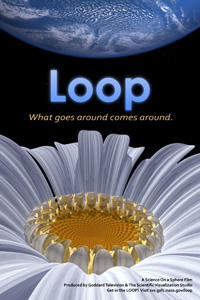
Movement, in its many forms, often comes from things out of balance trying to return to the middle. Ripples radiating across a still pond will ultimately settle; ice floating in a glass of water gradually yields to room temperature. But in life, as in the natural world, there's always something knocking things in balance out. There's always something destabilizing the world, even as the world gradually tries to find stability, to find balance. This endless back and forth--destabilization versus equilibrium--is precisely what propels circulation.
LOOP considers this propulsion. Things exist; they get knocked out of balance; they try to regain balance. By looking at several specific examples from the natural world, circulation becomes a frame for understanding equilibrium. But as narrative devices, circulation and equilibrium become the creative machinery for a beautiful new movie.
Along with its carefully staged scientific examples, LOOP also presents a metaphoric shadow play about how life endures. The natural world does not consider the variables and vagaries of human existence. The natural world simply exists; it simply continues. As the eternal backdrop for everyone's unique journey, the natural world can serve as the ultimate reflecting surface, a mirror for considering life's great opportunities and challenges.
In ways as varied and diverse as humanity itself, the natural world moves constantly as living parts of it struggle to endure. History tells of epic geographic migrations. Individual people grumble more intimate tales about ordinary journeys across suburban neighborhoods. Both extremes of humanity's movement scale speak to a greater truth. To echo the American poet Mark Strand, we move to keep things whole. The human experience is perhaps best described by the internal vicissitudes and emotional terrain each of us travel alone, even as we travel alongside others.